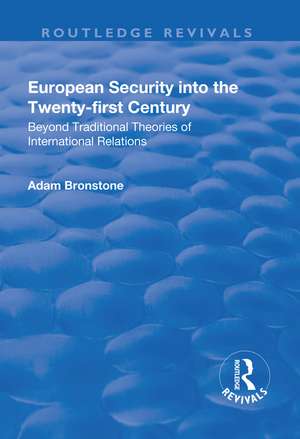European Security into the Twenty-First Century: Beyond Traditional Theories of International Relations: Routledge Revivals
Autor Adam Bronstoneen Limba Engleză Hardback – 21 dec 2017
| Toate formatele și edițiile | Preț | Express |
|---|---|---|
| Paperback (1) | 216.81 lei 6-8 săpt. | |
| Taylor & Francis – 11 noi 2019 | 216.81 lei 6-8 săpt. | |
| Hardback (1) | 625.03 lei 6-8 săpt. | |
| Taylor & Francis – 21 dec 2017 | 625.03 lei 6-8 săpt. |
Din seria Routledge Revivals
- 9%
 Preț: 801.69 lei
Preț: 801.69 lei - 8%
 Preț: 432.15 lei
Preț: 432.15 lei -
 Preț: 153.81 lei
Preț: 153.81 lei -
 Preț: 230.80 lei
Preț: 230.80 lei -
 Preț: 294.72 lei
Preț: 294.72 lei -
 Preț: 258.72 lei
Preț: 258.72 lei - 9%
 Preț: 764.34 lei
Preț: 764.34 lei - 9%
 Preț: 903.41 lei
Preț: 903.41 lei -
 Preț: 296.10 lei
Preț: 296.10 lei -
 Preț: 342.36 lei
Preț: 342.36 lei - 9%
 Preț: 606.35 lei
Preț: 606.35 lei -
 Preț: 317.54 lei
Preț: 317.54 lei - 9%
 Preț: 764.28 lei
Preț: 764.28 lei -
 Preț: 257.00 lei
Preț: 257.00 lei -
 Preț: 238.40 lei
Preț: 238.40 lei -
 Preț: 259.47 lei
Preț: 259.47 lei - 9%
 Preț: 903.80 lei
Preț: 903.80 lei -
 Preț: 326.26 lei
Preț: 326.26 lei -
 Preț: 258.66 lei
Preț: 258.66 lei -
 Preț: 294.97 lei
Preț: 294.97 lei -
 Preț: 308.89 lei
Preț: 308.89 lei -
 Preț: 199.85 lei
Preț: 199.85 lei -
 Preț: 347.49 lei
Preț: 347.49 lei -
 Preț: 295.04 lei
Preț: 295.04 lei -
 Preț: 389.39 lei
Preț: 389.39 lei -
 Preț: 257.00 lei
Preț: 257.00 lei -
 Preț: 343.21 lei
Preț: 343.21 lei - 9%
 Preț: 640.90 lei
Preț: 640.90 lei - 9%
 Preț: 619.48 lei
Preț: 619.48 lei -
 Preț: 228.88 lei
Preț: 228.88 lei -
 Preț: 257.67 lei
Preț: 257.67 lei -
 Preț: 245.10 lei
Preț: 245.10 lei -
 Preț: 258.52 lei
Preț: 258.52 lei -
 Preț: 258.72 lei
Preț: 258.72 lei -
 Preț: 368.93 lei
Preț: 368.93 lei -
 Preț: 246.37 lei
Preț: 246.37 lei - 9%
 Preț: 832.07 lei
Preț: 832.07 lei -
 Preț: 258.66 lei
Preț: 258.66 lei -
 Preț: 286.98 lei
Preț: 286.98 lei - 18%
 Preț: 695.85 lei
Preț: 695.85 lei - 9%
 Preț: 934.94 lei
Preț: 934.94 lei - 5%
 Preț: 231.22 lei
Preț: 231.22 lei -
 Preț: 267.15 lei
Preț: 267.15 lei -
 Preț: 200.66 lei
Preț: 200.66 lei - 9%
 Preț: 638.61 lei
Preț: 638.61 lei -
 Preț: 259.68 lei
Preț: 259.68 lei - 9%
 Preț: 1038.45 lei
Preț: 1038.45 lei -
 Preț: 389.43 lei
Preț: 389.43 lei -
 Preț: 302.13 lei
Preț: 302.13 lei -
 Preț: 302.25 lei
Preț: 302.25 lei
Preț: 625.03 lei
Preț vechi: 839.00 lei
-26% Nou
Puncte Express: 938
Preț estimativ în valută:
119.60€ • 125.21$ • 98.96£
119.60€ • 125.21$ • 98.96£
Carte tipărită la comandă
Livrare economică 05-19 aprilie
Preluare comenzi: 021 569.72.76
Specificații
ISBN-13: 9781138736146
ISBN-10: 1138736147
Pagini: 266
Dimensiuni: 151 x 219 mm
Greutate: 0.45 kg
Ediția:1
Editura: Taylor & Francis
Colecția Routledge
Seria Routledge Revivals
Locul publicării:Oxford, United Kingdom
ISBN-10: 1138736147
Pagini: 266
Dimensiuni: 151 x 219 mm
Greutate: 0.45 kg
Ediția:1
Editura: Taylor & Francis
Colecția Routledge
Seria Routledge Revivals
Locul publicării:Oxford, United Kingdom
Cuprins
Contents: NATO, Russia and Eastern Enlargement: NATO enlargement: an initial assessment; Theorizing with Gramsci; NATO enlargement: a substantive Gramscian proposal. European Union, Turkey and Eastern Enlargement: IR theory and EPC/CFSP: the case for a different approach; Euro-Turkish relations: the saga; Putnam and Turkey: do the twain meet?; Endings: Conclusions; Bibliography; Index.
Recenzii
’...succeeds in conducting a thorough literature review of international relations theories since 1945, as well as tackling some important issues, such as the enlargement of NATO. The book has a well-stuctured chronological arrangement and makes a very useful contribution to help those studying international relations.’ Aslib Book Guide ’...will be of great interest to academics and students in the field of International Relations.’ European Access Plus
Descriere
This title was first published in 2000: Both NATO and the European Union are in the early stages of enlargement processes that will see both organizations expand to include a number of former Communist countries from Central Europe. This work brings together both processes of enlargement in order to examine whether or not similar mistakes are being made by both organizations, with grave consequences both practically and theoretically for the field of international relations.
